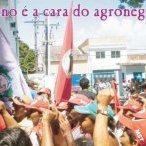English · Español

3 de marzo de 2011 | Noticias | Género
No Poison
Thousands of Brazilian women mobilize against agrotoxics
Descargar: MP3 (1.8 MB)
Since 2008, Brazil is the world largest agrotoxic consumer, as a result of the growth of big agricultural companies operating in the rural areas. Brazilian health authorities recognize that at least 12 chemical substances banned in other countries are commercialized in Brazil.
The World Health Organization (WHO) estimates that there are three million cases of poisoning due to agrotoxics per year at global level, out of which 70% take place in third world countries. The International Labour Organization (ILO) estimates that 70 thousand people die per year as a consequence of inadequate use of these products.
All in all, there are more than enough elements to justify a serious discussion about the use of agrotoxics. This way, thousands of Brazilian women are mobilizing this week throughout Brazil to denounce the impacts caused by these products on peasants and rural workers.
The Landless Rural Workers Movement (MST), the Dam-Affected Peoples Movement (MAB), the Small Farmers Movement (MPA) and the Pastoral Land Commission (CPT) are participating in these mobilizations.
The intensive use of agrotoxics is especially affecting women, according to these groups. They speak of an increase in the cases of cancer, skin allergies, abortions and children born with birth defects. They warn that the companies that ¨produce the poison¨ are the same companies that later sell the medicines to fight these diseases.
¨Their aim is to profit¨, they regret.
Men and women work for poor salaries, and the unemployed workers of the rural world and peasant communities are the most affected by the agrotoxics of the agribusiness model. ¨They are condemned to live in the most polluted areas and to consume food filled with agrotoxics¨, they argue.
The action days against poison have mobilized women from La Via Campesina in nine Brazilian States. Mato Grosso, Parana and Sao Paulo are the largest consumers of these products, according to the MST.
After a small fall in 2009, the agrotoxics industry gained strength in 2010 and reached record levels in 2008, according to a report by Folha de Sao Paulo.
46 per cent of these products are used in soy crops, 11 per cent in sugarcane, 10 per cent in cotton, 10 per cent in maize and the rest in other crops such as coffee and citrus fruits.








